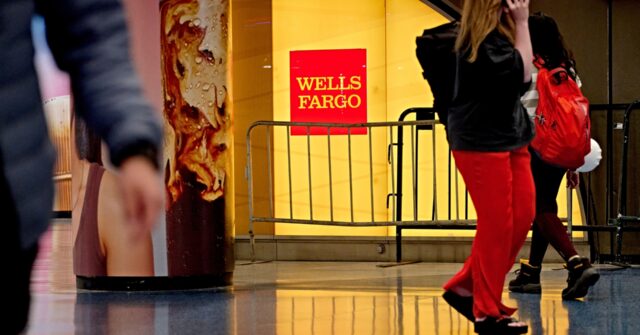The Chinese Foreign Ministry confirmed on Monday that Wells Fargo executive Mao Chenyue is trapped in the country, claiming she is part of a “criminal case” and has an “obligation to cooperation.”
Wells Fargo confirmed on Friday that the Atlanta-based American citizen had traveled to China and, upon attempting to return home, discovered the communist regime would not let her leave Chinese soil. The bank offered few details – appearing not to have any – and suspended all travel for its employees to China as a result.
Reports followed this weekend that the Chinese government had imposed an exit ban on another American citizen, reportedly an employee for the U.S. Commerce Department, but the Foreign Ministry did not comment on that case on Monday.
Asked about Mao Chenyue on Monday, Foreign Ministry spokesman Guo Jiakun insisted that her case was being handled appropriately and the Chinese Communist Party abides by the rule of law.
“According to what we’ve learned, Ms. Mao Chenyue is involved in a criminal case currently being handled by Chinese law-enforcement authorities and is subjected to exit restrictions in accordance with the law,” Guo said. “Pursuant to Chinese laws, with the case still under investigation, Ms. Mao cannot leave the country for the time being and has an obligation to cooperate with the investigation.”
“We will protect Ms. Mao’s lawful rights and interests during the investigation in accordance with the law,” he assured reporters.
Guo added, in recognition that the case has alarmed international investors and others in the finance sector, that China “will as always welcome people from all countries to travel and do business in China and ensure their rights and interests in accordance with the law.”
Guo did not offer any details regarding what criminal case Mao was supposedly involved in or what her role in the situation is, nor did he suggest that Mao is facing criminal charges herself. Reports on Friday of her detention citing unnamed sources also did not indicate that Mao had been involved in any high-risk activity prior to the Chinese government blocking her from returning home. In addition to her work in Wells Fargo, which reportedly centered around selling accounts receivable to third parties, Mao held a chairwoman role with a global industry organization focused on accounts receivable known as FCI.
Prior to her latest visit to China, Mao reportedly traveled to the country regularly and engaged closely in work with Chinese corporation, in her capacity on accounts receivable.
Wells Fargo did not offer any information on the situation when it confirmed that she could not leave the country. It did confirm the situation.
“We’re closely tracking this situation and working through the appropriate channels so our employee can return to the United States as soon as possible,” a statement from the bank read.
The American embassy in Beijing stated last week that it is engaged in the case and has “raised” its concern with the Communist Party, not just on Mao’s case but “the impact arbitrary exit bans on U.S. citizens have on our bilateral relations.”
Guo, the Chinese Foreign Ministry spokesman, responded to a question about the unnamed U.S. Commerce Department employee by stating that he had “no details” and reiterating, “China upholds the rule of law and handles entry and exit affairs in accordance with the law.”
The Hong Kong-based South China Morning Post reported on Monday that the individual associated with the Commerce Department trapped in China is an American citizen who had traveled to China to visit family. Unlike Mao, who reportedly found out about the exit plan upon trying to leave the country but reportedly had an unremarkable trip to China otherwise, the Post reported that the Commerce Department employee was immediately detained upon landing in Chengdu, China.
The unnamed individual reportedly served in the U.S. Army, though no publicly available information indicates that his military past played a role in his abduction.
“As principle, China always welcomes foreign citizens, including those of the United States, to come to China,” a spokesman for the Chinese embassy in Washington told the Post, “and guarantees their safety and legitimate rights and interests in China in accordance with the law, including freedom of entry and exit.”
“Meanwhile, foreign citizens in China should also respect and abide by Chinese laws,” he added ominously.
The spokesman, Liu Pengyu, published a propaganda video on Monday showing the alleged “ease and openness” of traveling to China.
China’s economy has experienced a catastrophic decline in foreign investment and international economic activity following the Communist Party’s imposition of strict house arrest protocols on tens of millions of people in the aftermath of the Wuhan coronavirus outbreak in the country in 2020. Adding to global alarm about doing business in the country was the high-profile destruction of the career of Alibaba executive Jack Ma, once the wealthiest man in China, following his bizarre disappearance in 2021 and subsequent reemergence abroad. Ma had mildly criticized the economic policies of genocidal dictator Xi Jinping prior to his purging.
Following years of significant foreign investment decline, the Chinese Communist Party welcomed Ma for a visit in November 2024, parading him as evidence that foreign executives should not worry about government retribution if operating in China. That did little to improve China’s economic landscape, so in February the Ministry of Commerce published a 20-point “action plan” to “encourage foreign companies to make equity investment in China and guide high-quality foreign capital toward long-term investment in China’s publicly listed companies.”
Follow Frances Martel on Facebook and Twitter.
Read the full article here


